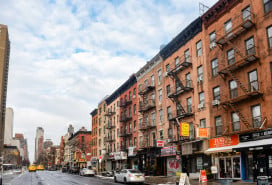Growing up in New York: a teenager talks co-op living

I’m 16 years old and grew up—or, I suppose, am growing up—in an apartment on the Upper West Side. When I tell non-New Yorkers this, they look at me in shock: “Can your parents hear everything you do?” they ask. “Where do you hang out with your friends? So does that mean you don’t have a backyard?”
I’ve lived in the same two-bedroom, 1.5-bathroom apartment in the same prewar, elevator co-op building for 11 years. Being a kid in an apartment is not like being a kid in a suburban home—there are a few sacrifices. (Yes, a backyard is one. I also share a bathroom with my parents, which seems to bother some of my friends more than it bothers me.) But the experience of living in the city also comes with hundreds of little freedoms, eye-opening cultural interactions and things to do on rainy days. Here are a few observations on what it's like to grow up in a New York City co-op:
We’re OK with less space
To kids growing up in the city, space is (literally) a small matter. We get privacy when our parents are working, our siblings are at a friend’s house, or we’re reading a book or on a computer. Our ability to work, read, eat or sleep is not impeded by having only one living room (as in, no den, TV room and study). Not once in the 11 years I’ve lived in a co-op have I felt cramped or deprived of any kind of physical privacy. I don’t feel deprived at all, and when I (or my friends) want more alone time, we go outside. In fact, there's hardly a more private place than the streets of New York.
I’m an only child, but even my friends with siblings make it work. I know one family who made a compromise: one son would get a bigger bedroom and share a bathroom with his parents, while the other would get a smaller room (it was cut out of the den in a renovation) and his own bathroom. I know twin sisters who split a bedroom. I know a younger sister who shared a room with her brother until she was 13, and then got a room that was carved from the living room and kitchen during a renovation.
It's hard for me to understand why a family of three would need anything bigger than a two-bedroom apartment, and I'm not alone. When some of my friends and I visit other friends who live in palatial apartments—and by that I mean a couple thousand square feet, probably the same as an average suburban house—we have a critical eye. The first time we visited one classmate’s downtown Manhattan penthouse, which spanned several floors and includes rooftop space, we were kind of taken aback. You’re allowed to spend your money how you like, but in a city where living space is so coveted, it seems bizarre for so few people to buy up so much square footage, like a single person tucking into a dinner for four.
The elevator is NYC’s front lawn
Many New York neighbors try to have as little to do with each other as possible. Perhaps this is because, in such close quarters and through such thin walls, any kind of personal relationship beyond small talk can be awkward. Let’s put it this way: I’m closer to the guys who work at the Lenny's up the street than I am with the majority of my neighbors.
That said, most non-apartment dwellers miss out on the social incubator of the elevator (or, I’d imagine, the lobby or stairs in a walk-up). That shared 67-second ride with a neighbor—twice a day, every day—leads to plenty of small talk and keeping up with the big events in one another’s lives. After 11 years, I still forget the names of most of my neighbors, but I do know that 3B’s sister got married and 6A’s pregnant again. And though it does seem like a pretty one-dimensional sort of relationship, it’s always nice to have those 67-second updates on the life of someone you care just enough about.
Building politics influence our friendships
Inter-apartment diplomacy is surprisingly tricky, even for kids. For example, for the first few years, we lived next door to a family with a boy my age. We went to different schools, but we would play together, and we got along really well. Yet, for reasons I don’t quite know, it never became the kind of relationship where we could just pop on over. If I wanted to see him, my mom would have to go through the same play-date bureaucracy as all the other out-of-building mothers and schedule a time for me to play with him even though only about 12 inches of wall separated our living rooms. Maybe this was to maintain the boundaries that New York neighbors are so good at setting up.
When I was about 10 years old, the relationship came to a bizarre end—a fate, I later learned, not uncommon to other people who live in co-ops. For the first time, my dad was on the co-op board, and we wanted a dog. Now, our building had banned dogs for many years, and our next-door neighbors were not exactly inclined to change that. As a matter of fact, they were downright adamant about keeping our building dog-free, while my dad worked alongside others on getting the bill or law or sanction or whatever-you-call-it passed. To my surprise, what I viewed as a small technical disagreement, nothing personal, led to the dissolution of my friendship with the kid next door. Suddenly, he was always busy when my mother emailed his mother to invite him over.
The moral of the story: adults’ harmless if opposing opinions on building regulations can affect whether their children are allowed to play together. Sad, yes; silly, yes; but seemingly true.
A metropolis at our doorstep
I love my apartment, but I love the concept of apartments more. When millions of people conserve their living quarters, a metropolis of different kinds of food, stores, entertainment, museums, parks, jobs, people, and God-knows-what-else grows in the space that isn’t occupied by driveways and TV rooms and the rest. And it’s all just a walk, bus or subway ride away ... no driver's license or parental transport required.
Related:
8 reasons your children should grow up in New York
Raising kids in an apartment building: 7 classic dilemmas solved
Strollers 101: how to survive vertical living with a baby buggy in tow
NYC's 10 best nabes for young families (including 5 you may not have considered)
Real estate with kids: find a place, make nice with the neighbors, and more


























